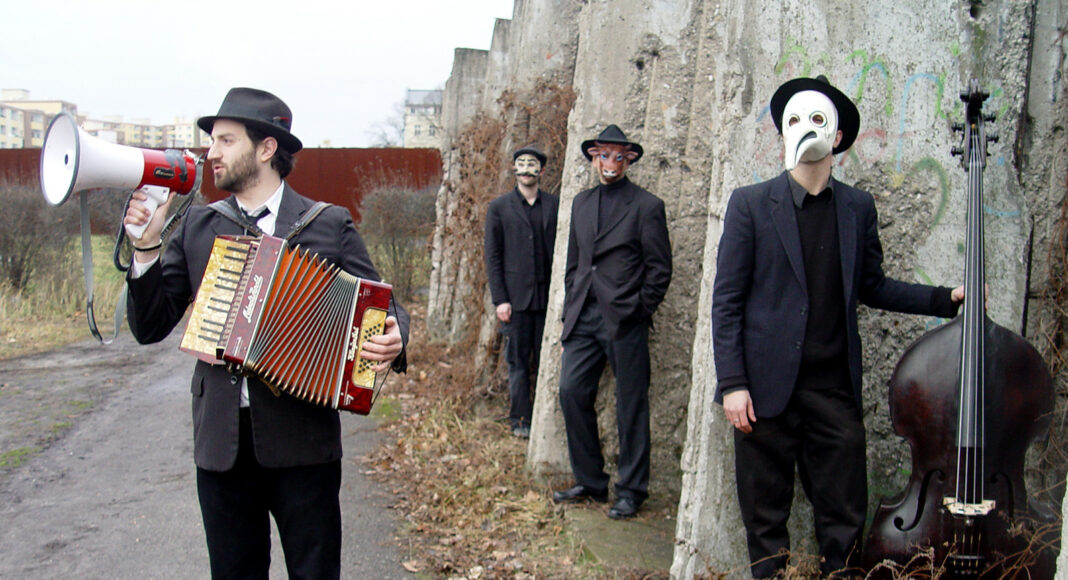Fairly or not, contemporary Klezmer music is often associated with traditional Jewish weddings. But Daniel Kahn’s band, The Painted Bird, has performed at just one matrimonial ceremony.
“And it was, like, a radical, queer, anarchist wedding,” says Kahn.
But that makes sense, considering The Painted Bird’s general M.O. It’s not uncommon for the group to take gigs like their mid-October show in Berlin. It was during a rally tabbed “Unteilbar” (“Indivisible”) in Berlin’s city center, a political demonstration against far-right agitation in Germany and other countries in Europe. It attracted an estimated 240,000 people.
“It was great,” says Kahn, “to be able to stand up in front of that many people and sing a 130-year-old Yiddish song about the revolutionary power of working women.”
The American-born singer and songwriter brings his band to the Schultz Cultural Arts Hall in Palo Alto next week for a blast of hybridized, contemporary folk—deeply informed by traditional Klezmer, but just as profoundly shaped by radical Yiddish folk, political cabaret and a fat dose of punk rock.
The group’s latest recording, The Butcher’s Share, is an explosive mix of the old and the new, an energetic effort to keep the struggles of early 20th-century Europe relevant to the world in the early 21st century.
Kahn, who plays accordion, piano and guitar, was born in Detroit and grew up a Michigander until he relocated to Berlin in 2005, where his education into the Yiddish musical tradition deepened into the kind of theatrical musical activism that The Painted Bird is known for.
The band embraces old folk songs that have something say about the current world situation. But it is also creating new ones, such as the anthemic “Freedom is a Verb,” a dizzy, intensely swirling fight song that works as a kind of Klezmer version on Marvin Gaye’s “What’s Going On” (give the song style points for rhyming “higher rents” with “violence”).
Kahn’s path to the activist Yiddish music of the early 1900s began, he said, with the decidedly Gentile singer-songwriter Woody Guthrie. It was American folk that convinced him of music’s power to reflect people’s everyday life and to build connections of common experience.
“I’ve always been drawn to music that really addresses the fabric of normal people’s lives,” he says. “Folk songs are very functional. They served as a kind of social media, and they are the most portable form of storytelling. Nobody would have any idea who Frankie and Johnny were had that actual incident not turned into a folk song.”
As part of his artistic mission, Kahn—who also has a background in theater—seeks to revive old traditional ballads, Hasidic songs or other folk music that can breathe in today’s political environment. As a way to understand such songs, Kahn presents visual art (by noted graphic artist Eric Drooker whose work has been on the cover of The New Yorker) and supertitle translations projected onto a screen behind the band.
“When I got into Yiddish songs, I found all these great stories that had so much to say about the world today but they all sort of stopped at the barrier of language and culture,” he explains. So, he’s translated such songs, “not only so that we can learn about that time, but also so they can help us learn about our times.”
Kahn’s spiritual hero Guthrie was famous for writing “This machine kills fascists” on his guitar, but Kahn is more of a realist when it comes to artists standing against what he sees as a global trend toward authoritarianism.
“Look, nobody reminisces about how the cabaret artists of Berlin prevented the rise of the Nazis,” he says. “I don’t think that music can create a revolution. But that doesn’t detract from its usefulness.
“I’ve been singing ‘Embrace the Fascists,’ this 1931 anti-fascist song Berlin cabaret song, for 11, 12 years now, back when I thought I was making a unique point. And I had a conversation with Eric (Drooker) about this. And we both kind of agreed, it feels like shit to be right about these things. I wish we could stop singing these songs. I wish they could go back to being just historical artifacts.”
Daniel Kahn & The Painted Bird
Nov 15, 7:30pm, $25
Oshman Family JCC, Palo Alto



